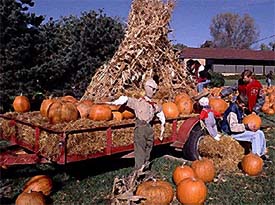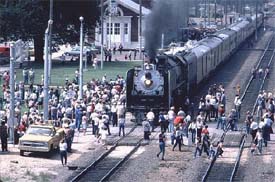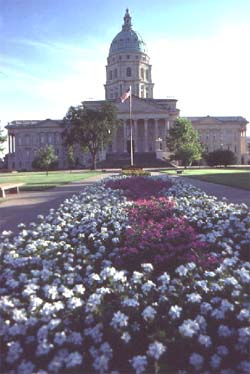
|
Minor Details
 All most people know about Topeka, Kansas is
that it's the home of the notorious Fred Phelps clan. Phelps is the
disbarred Kansas attorney who gathered a group of family members around him
to form the Westboro Baptist Church and to ordain him their minister. All most people know about Topeka, Kansas is
that it's the home of the notorious Fred Phelps clan. Phelps is the
disbarred Kansas attorney who gathered a group of family members around him
to form the Westboro Baptist Church and to ordain him their minister.
Phelps came upon a way to gain attention for himself and his tiny family affair all in the name of God: picket the funerals of AIDS victims with the most outrageous, attention-getting signs and taunts. As this wore thin on the local scene, he took his attention-seeking crusade nationally to funerals such as Randy Shilts' and Matthew Shepherd's. For more airtime he added other events, demonstrating at political and entertainment gatherings. Just as the drug addict needs more and stronger fixes, the Phelps gang needed more shocking signs and hateful taunts to keep in the national spotlight. Since the media are quite fickle, they also needed new venues to haunt and personalities who were more mainstream to picket. Now, Topeka is a small city in the middle of the American heartland. In some ways it represents many American cities and towns -- conservative, cautious, and convinced that the greatest compliment that one can pay any group of people is: "They blend in." That means they don't call attention to themselves or that they allow people to think that the straight, white, male is the norm everyone in town adores and follows. In addition, Topeka is the capital of a state that has basically been taken over by religious and political right-wing extremists who would like nothing better than to have evolution thrown out of the public schools, abortion unavailable to women, and LGBT people available as handy objects for discrimination. Most Democratic politicians in Kansas would qualify as Republican conservatives and moderates in many other states. It's not the Big Apple, the City by the Bay, West Hollywood, P-town, or the Big Easy. It's one of those towns LGBT people flee from and often use as the butt of their jokes. It's easy to give up on such places and write them off as lost
And slowly and painfully they've made progress. They've had to fight the right every step of the way. They've encountered conservative, homophobic religious groups who opposed them but felt even more righteous about their bigotry because they weren't as hateful-looking as the Phelps clan. They've fought and influenced a daily newspaper that preferred to ignore them. They've encountered city and county leaders who would rather grandstand or hide than consider the issue. They've pushed, been defeated, and pushed again. On September 10, 2002, the Topeka City Council, with a loud group of 600 outside representing all views on the issue, adopted an ordinance making it unlawful to commit certain crimes motivated by intimidation or bias, and the ordinance included "sexual orientation." The evening was mixed, for "gender identity or expression" was removed from the proposal that had been submitted by four of the council members. In addition, a mere 5-4 vote rejected a second ordinance which would have included sexual orientation and gender identity or expression in the city's nondiscrimination policy.
 The tired group who worked to accomplish more was
disappointed. Who can blame them? Their goals for that late summer evening
were much higher. The temptation of many would be to give up, to consider
this September 2002 outcome a failure.
The tired group who worked to accomplish more was
disappointed. Who can blame them? Their goals for that late summer evening
were much higher. The temptation of many would be to give up, to consider
this September 2002 outcome a failure.
And yet, against great odds, they've moved their community forward. Certainly, discrimination is still legal in Topeka, but there are now legally-defined crimes of hate when the victims are targeted because of their sexual orientation. Sexual orientation is now a legal category no longer unspoken in Topeka. So, it's not over in Topeka, Kansas. Those who fought this good fight are even more experienced, better organized, in touch with more people, and more visible to everyone as a force to be reckoned with. And they have set an agenda to which others must react rather than to wait for anti-gay forces to make the next move. They'll return again after a short breather, to fight the next battle, to take the next step. That's how most permanent progress takes place, not in a straight-line fashion but through zigs and zags. In the recruitment video for the Christian Coalition, Pat Robertson tells his followers that: "It's the last one remaining in the room who wins." They know that their fight is a long one, and their hope is to wear down their opponents so their opponents will walk out and allow Coalition members to be the last ones standing. 
And the Christian Coalition did not reach the highpoint of its influence in a mere few years. They began their mailing lists in the 1964 presidential campaign of Barry Goldwater. Every defeat was a means to add to their mailing list, refine their strategy, and redefine their intentions. Progressive leaders reach their goals because they stay in the room, especially in all the towns and cities in our country that Topeka, Kansas represents. They know it's a long battle. They get very tired, but they come back again and again. And each time the door of the closet opens a little further before it slams back shut again. But with each effort it never closes as tightly as before. It's happening everywhere, slowly, but surely. And it's because people like those in Topeka, Kansas, are making it happen against seemingly insurmountable odds. On this Thanksgiving, thank you Topeka, Tulsa, Des Moines, Springfield, Birmingham, Albuquerque, and Salt Lake City-- from all of us. Thank you to the activists in other small towns we never hear about, all the towns and cities hardly considered by outsiders. Remember what an old Rabbi said, "If you have a dream that can be fulfilled in one lifetime, it's too small." Robert N. Minor is the author of Scared Straight: Why It's So Hard to Accept Gay People and Why It's So Hard to Be Human (HumanityWorks!, 2001) and Professor of Religious Studies at the University of Kansas. He may be reached at www.fairnessproject.org. |
|
 But Topeka, Kansas is also the home of a small and growing band of activists
who decided more than a decade ago to change the climate of oppression against LGBT people
in their hometown. They are lesbian, gay, bisexual, and transgender people, PFLAG parents and
friends, and a growing list of progressive allies. They're leaders who have
worked through a series of organizations to produce rallies, pride
festivals, pride parades, demonstrations, and political activities.
But Topeka, Kansas is also the home of a small and growing band of activists
who decided more than a decade ago to change the climate of oppression against LGBT people
in their hometown. They are lesbian, gay, bisexual, and transgender people, PFLAG parents and
friends, and a growing list of progressive allies. They're leaders who have
worked through a series of organizations to produce rallies, pride
festivals, pride parades, demonstrations, and political activities.